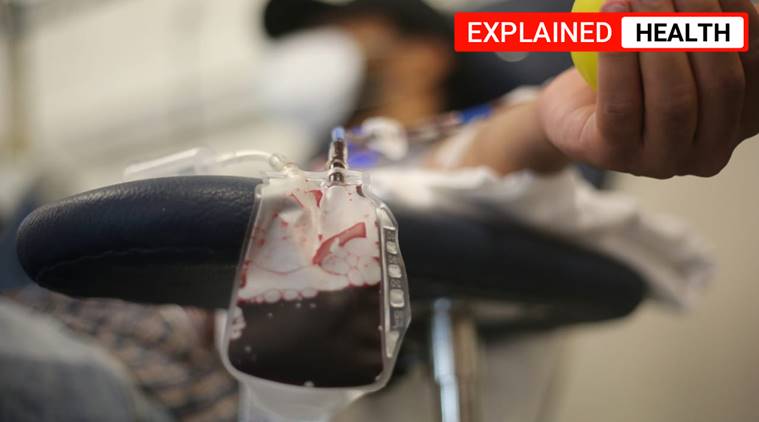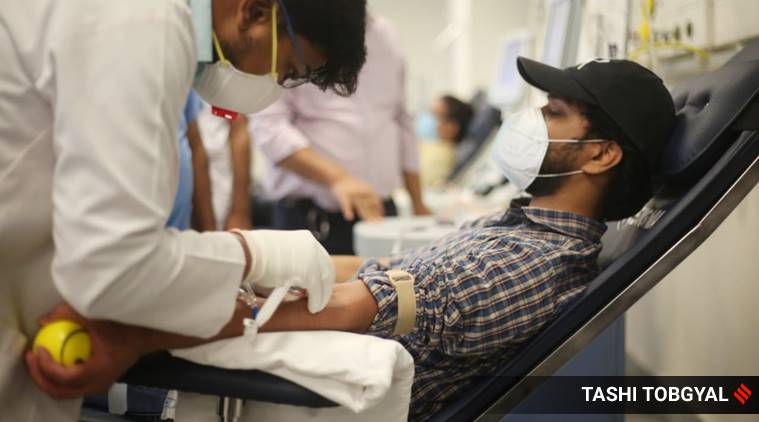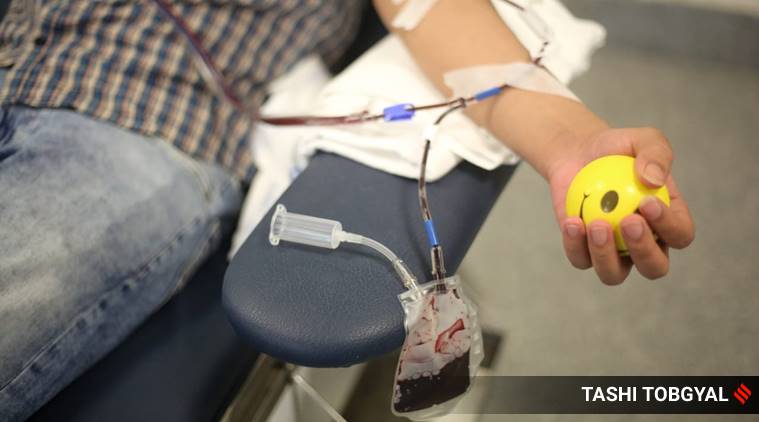- India
- International
India gets its first plasma bank: All you wanted to know about this treatment for Covid-19
A patient who is eligible and willing to donate plasma may call 1031 or WhatsApp details at 8800007722. A team of doctors will get in touch with the patient to confirm eligibility. A vehicle will then be sent to the donor's home.
 Delhi plasma bank: The bank collects 500 ml of plasma, depending on weight. (Express Photo: Tashi Tobgyal)
Delhi plasma bank: The bank collects 500 ml of plasma, depending on weight. (Express Photo: Tashi Tobgyal)
On Thursday (July 2), Delhi Chief Minister Arvind Kejriwal inaugurated India’s first plasma bank at the Institute of Liver and Biliary Sciences (ILBS) to ease access to plasma that is being used as a trial to treat Covid-19 patients. The bank will coordinate with patients who have recovered from Covid-19, and are eligible to donate plasma.
What is a plasma bank? Why was it set up?
A plasma bank functions like a blood bank, and has been created specifically for those who are suffering from Covid-19, and have been advised the therapy by doctors. The facility has been set up at the ILBS, which will be the nodal centre for collection of plasma.
In Delhi, seven hospitals have permission to conduct these trials on Covid-19 patients. These are All India Institute of Medical Sciences (AIIMS), Maulana Azad Medical College (MAMC) in coordination with Institute of Liver and Biliary Sciences (ILBS), Indraprastha Apollo Hospital, Batra Hospital, Lady Hardinge Medical College, Ram Manohar Lohia (RML) Hospital and Max Hospital Saket.
“The rising demand for plasma among the patients pushed the government to set up a one-stop centre for the donors. Plasma was not easily available and the patient’s attendants were running from pillar to post in search of plasma from a recovered patient. People were also scared of stepping into a Covid hospital, so we decided to set up in a non-Covid facility,” said Dr S K Sarin, head of ILBS.

In plasma therapy, the antibody rich plasma from a recovered patient is extracted and administered to a patient. The trials are trying to find out if the antibodies can help patients recover.
 Delhi plasma bank: Sagar Negi, 28, was the first donor at the Delhi Plasma Bank in the Institute of Liver and Biliary Sciences. (Express Photo: Tashi Tobgyal)
Delhi plasma bank: Sagar Negi, 28, was the first donor at the Delhi Plasma Bank in the Institute of Liver and Biliary Sciences. (Express Photo: Tashi Tobgyal)
So, who can donate plasma?
Those who had the disease, but have recovered at least 14 days before the donation can be considered — although doctors prefer a time of three weeks between recovery and donation.
People between the ages of 18 and 60, and weighing not less than 50 kg are eligible. Women who have given birth are not eligible, as the antibodies they produce during pregnancy (after being exposed to the blood of the foetus) can interfere with lung function.
📣 Express Explained is now on Telegram. Click here to join our channel (@ieexplained) and stay updated with the latest
People with comorbidities such as diabetes, hypertension, and cancer are also excluded. Once you reach the centre, a doctor will take a detailed medical history and conduct a physical examination (Height, Weight, Blood Pressure, Temperature, adequate veins for phlebotomy).
The extensive checks and stringent eligibility conditions are among the reasons that finding an apt donor for Covid-19 patients is proving to be a problem. While the number of patients who have recovered in Delhi is around 63,000 at present, this figure was around 21,000 two weeks ago. Three weeks ago, it was around 13,000. The pool, therefore, is already small, and the stringent eligibility conditions mean more are excluded.
What test are carried out before donating plasma?
Laboratory tests are carried out to assess various conditions — serum protein and CBC, TTI testing for hepatitis B virus, hepatitis C virus, HIV, malaria, and syphilis — and for blood grouping and antibody screening. Serum Covid-19 specific IgG antibody concentration higher than 80 is preferred.
How can a donor contact the bank?
A patient who is eligible and willing to donate plasma may call 1031 or WhatsApp details at 8800007722. A team of doctors will then get in touch with the patient to further confirm eligibility. A vehicle will be sent to the donor’s home, or the government will reimburse transportation cost.
 Delhi plasma bank: The extensive checks and stringent eligibility conditions are among the reasons that finding an apt donor for Covid-19 patients is proving to be a problem. (Express Photo: Tashi Tobgyal)
Delhi plasma bank: The extensive checks and stringent eligibility conditions are among the reasons that finding an apt donor for Covid-19 patients is proving to be a problem. (Express Photo: Tashi Tobgyal)
Can a patient’s family directly contact the plasma bank?
No. Each hospital should contact the plasma bank along with the details of the patient who is in need of plasma therapy. All Delhi hospitals will have to appoint a nodal officer who will be coordinating with the ILBS for plasma.
How many people would be benefitted by one person’s donation?
Each plasma donation would be used to treat 2 patients. The bank collects 500 ml of plasma, depending on weight.
How does plasma donation differ from blood donation?
In plasma donation, as opposed to blood donation, only plasma is extracted and the other components of blood are returned to the body.
“Blood contains several components, including red blood cells, platelets, white blood cells, and plasma. During a whole blood donation, donors typically donate a pint (about a half litre) of blood. During automated donation (apheresis), you will be connected to the apheresis machine using a fully disposable one-time use apheresis kit. The process uses a single needle. The machine will selectively retain the plasma and return all red blood cells and other components of blood. All plasma proteins lost by you due to donation will be formed again in 24-72 hours,” Dr Sarin said.
How often can a recovered patient donate plasma?
500 ml of plasma can be donated every two weeks, while blood can be donated once in three months. “This is safer with very little stress on the body. Plasma can be stored for a year, as frozen plasma will still have antibodies. The antibody level doesn’t decrease in a person’s body,” Dr Sarin said.
More Explained
EXPRESS OPINION
Apr 19: Latest News
- 01
- 02
- 03
- 04
- 05








































